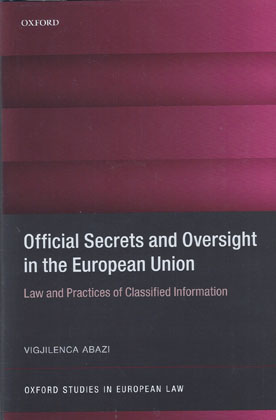
This monograph offers a uniquely comprehensive and in-depth legal account of official secrets in the European Union. It critically analyses their implications for oversight and fundamental rights.
Based on forty interviews with practitioners and other stakeholders, it offers an understanding of the practices of official secrets and provides a critical and much-needed perspective on how parliamentary, judicial and administrative oversight institutions deal with access to classified material and the dilemma of oversight to concurrently ensure secrecy necessary for EU security policies and openness needed for democratic processes and fundamental rights.
The book discerns shifts in institutional practice of oversight at the European Parliament and the Court of Justice of the European Union that disproportionately favour secrecy and the protection of classified documents while creating serious limitations to open democratic deliberations and access to justice, and delivers new insights on the EU's development as a security actor as well as its autonomy from Member States, showing how rules on official secrets were a means for the EU to gain more autonomy in external security cooperation.